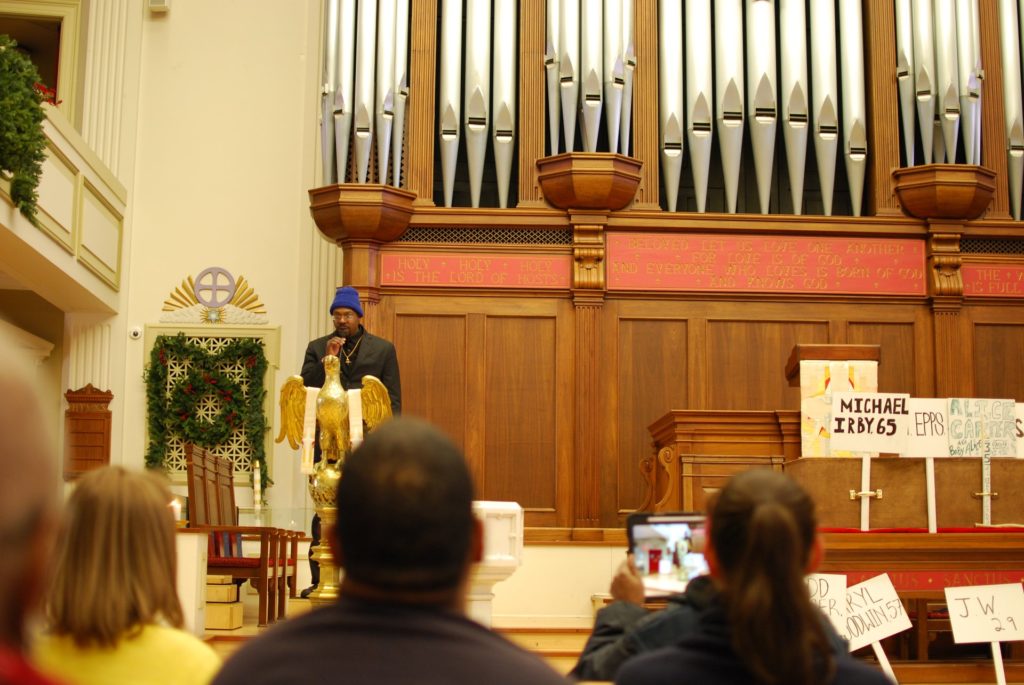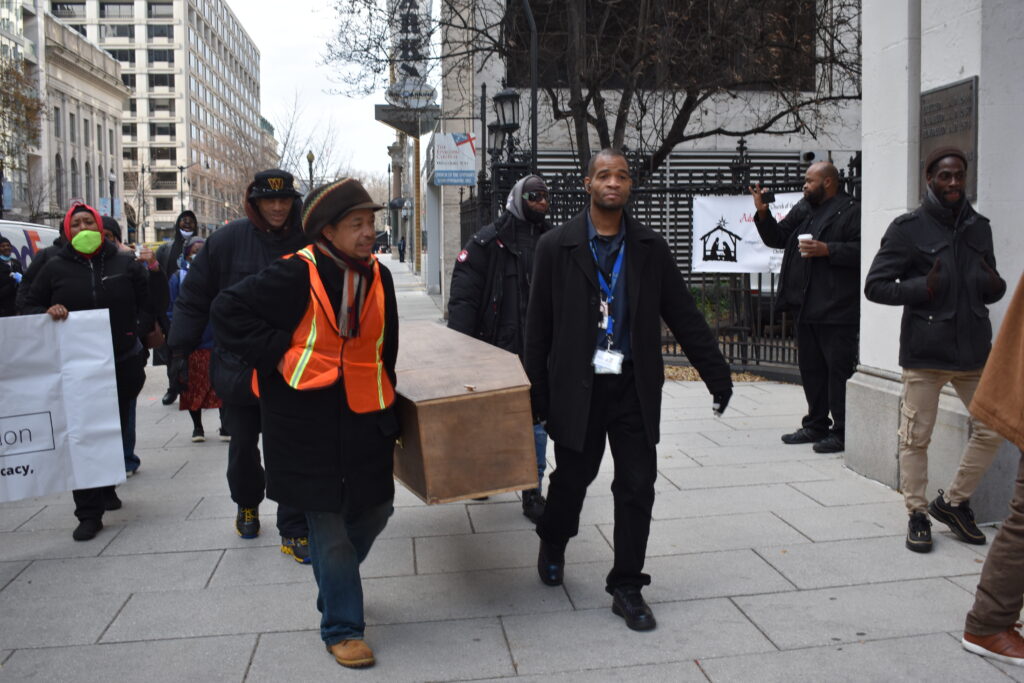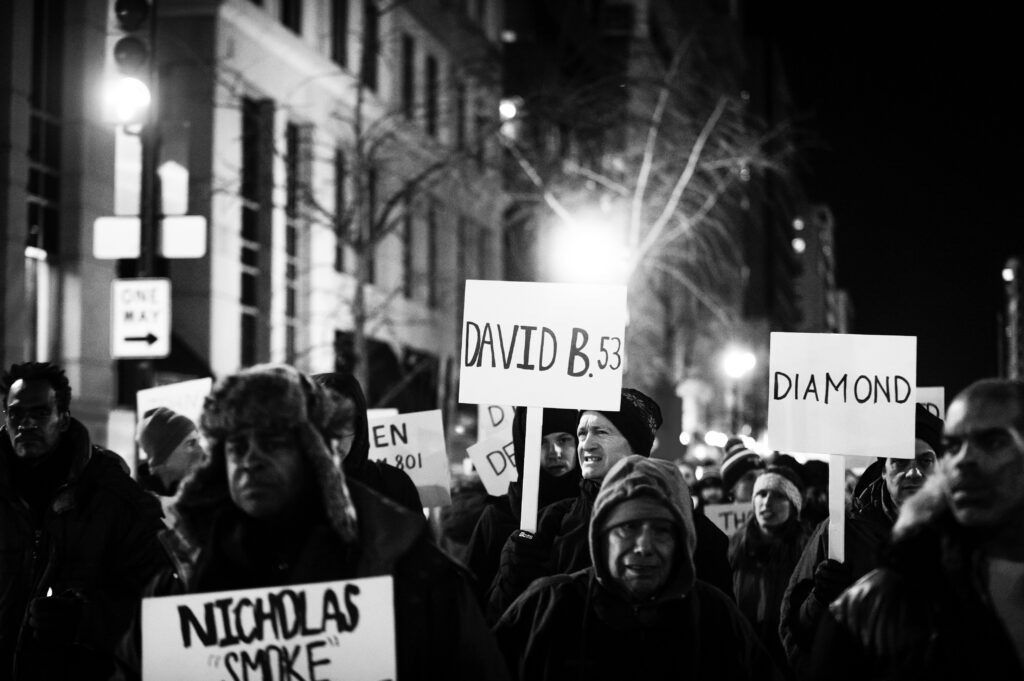Around 50 people gathered inside of New York Avenue Presbyterian Church on Friday, Dec. 20, in honor of National Homeless Person’s Memorial Day. The service was just one part of a series of events taking place in over 180 cities to remember those who had passed away during the year while experiencing homelessness.
Beginning with a candlelight procession and an overnight vigil, this year’s events culminated in a small gathering of local advocates and religious leaders to discuss the need to have compassion for those without homes and to support ways to help people into housing.
Reverend Alice Tewell of the New York Avenue Presbyterian Church began the service with a prayer:
“Holy God in the midst of winter, in the midst of difficult political and economic times, in the midst of great polarization…We pray for those who died on the streets and in shelters this past year, unrecognized and unseen.”
Tewell spoke on a podium that was adorned with golden wings. On stage, to her left, sat an empty coffin adorned with individual placards listing the names of those being remembered.
Reginald Black, the advocacy director for the People for Fairness Coalition, spoke of injustice saying that “Nobody should die this way, nobody should have to live on a street corner, at the underpass under a bridge, in a shelter, you know, people should have a place to live.”
Black said that their mission at the People for Fairness Coalition was to engage in advocacy on behalf of those experiencing homelessness, and to use their “lived experience as a catalyst for solutions.” Black and many other members of the coalition have experienced homelessness or are currently experiencing homelessness.
In his prepared comments, Steve Thomas, an advocate for the National Coalition for the Homeless, sought to draw attention to the printed list of names of people who died over the past year. Among the 81 people who passed away without homes, only 39 were identified—the remaining 42 names are those of people who were either unidentified at the time of death or whose information was kept private for a variety of reasons.
Another list was given to those attending the ceremony with the names of people who were recently housed, but had passed away. “Of those people who [we] don’t have names for,” Thomas said, “the ages range from 77 to age 3.” He then added that he was used to reading lists like this, that throughout the years, he had seen lists with people just as young.Seated in the pews, the audience lit white candles and held them up in silence while Thomas read through the lists of names.“Adeheid Russell, Age 68. Alice Carter, Age 35. Ben from 801, Age 63. Ben, Age 35. Bernard D, Age 46. D. Cotton, Age 69…Age 23, Age 28, Age 30, Age 31, Age 31, Age 34, Age 39, Age 43…”Following the roll call, Denyse Stuart from the Ebenezer AME Church led the congregation in a rendition of “Amazing Grace”:
“When we’ve been there ten thousand years,
Bright shining as the sun,
We’ve no less days to sing God’s praise
Than when we’d first begun.”
A somber mood overcame most of those standing in the audience, and several in attendance were tearful in their mourning. Many of those who tried to sing along struggled with overcoming their own emotion to vocalize their words.
Following the song, At-Large Councilmember David Grosso took to the podium to offer his own condolences and to say that “the human right to shelter and to housing is such a critical one, particularly during these winter months, and these very long nights.”
Grosso then called out the government and society in general for not “fulfilling this obligation.” He called upon residents to support the Michael Stoops Amendment which seeks to add homelessness as a protected class under the D.C. Human Rights Act.
Rabbi Shmuel Herzfeld from the Ohev Sholom Synagogue said that this was his first time speaking in a Presbyterian church. He explained that, in his faith, he is normally required to enter only into buildings that are of his specific faith.
“But when I received the invitation to honor those who died without the dignity of a home, I said that this is something that transcends any other law that binds me,” he said.
In the Jewish faith, he explained, there’s a tradition called a “shiva.” In this tradition, when someone passes people gather around and specifically talk about the person for an entire week. He asked everyone in attendance to think of this tradition, and encouraged them to try it for the week.
Queenie Featherstone, an advocate with the People for Fairness Coalition who is also a Street Sense Media artist and vendor, gave Marcy Bernbaum a gift to thank her for her guidance and leadership as a mentor and advisor for the coalition.Featherstone was followed by Rizwan Jaka of the All Dulles Area Muslim Society who emphasized the need for inter-faith collaboration on situations that involve the entire community. He spoke of the ways in which different faith groups all emphasize love for one’s neighbors.
Pastor Unchu Na from the Wilderness Ministry started the benediction by having members of the congregation take part in the chant from the previous evening’s march on 14th St: “Housing is a human right. Fight! Fight! Fight!”








